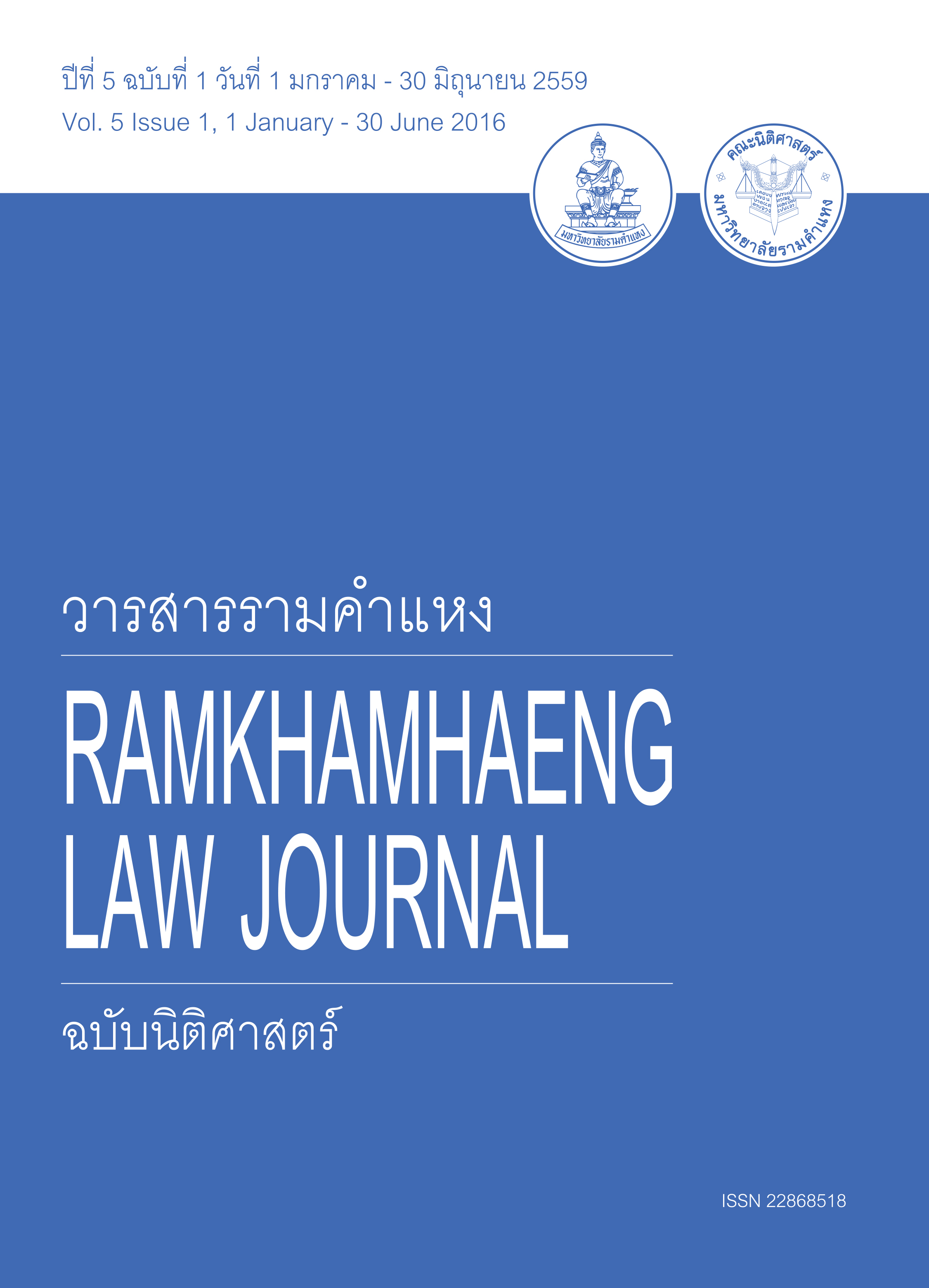สถานภาพทางกฎหมายของวัดที่มิได้รับพระราชทาน วิสุงคามสีมาและสำนักสงฆ์
Main Article Content
Abstract
การวิจัยครั้งนี้เป็นการวิจัยในเชิงคุณภาพ (Qualitative Research) ทางนิติศาสตร์ ผสมผสานกับทางรัฐศาสตร์ในลักษณะการวิจัยเอกสาร (Documentary Research) และการ วิจัยเชิงปริมาณ (Quantitative Research) จากการวิจัยภาคสนาม (Field Research) ด้วย การสัมภาษณ์เชิงลึก (In-depth Interview) และการใช้แบบสอบถาม (Questionnaire) รวมทั้งการสัมมนาเชิงปฏิบัติการเพื่อรับฟังความคิดเห็น จากประชากรกลุ่มตัวอย่าง 2 กลุ่ม ได้แก่กลุ่มพระภิกษุสงฆ์ และกลุ่มฆราวาส โดยนำข้อมูลเหล่านั้นมาอธิบายและวิเคราะห์เชิง เนื้อหา (Content Analysis) โดยมีวัตถุประสงค์เพื่อศึกษาถึงสถานภาพทางกฎหมายของวัด ที่มิได้รับพระราชทานวิสุงคามสีมาและสำนักสงฆ์ตลอดจนสภาพปัญหาอุปสรรค เพื่อ เสนอแนะมาตรการที่เหมาะสมเกี่ยวกับสถานภาพทางกฎหมายของวัดที่มิได้รับพระราชทาน วิสุงคามสีมาและสำนักสงฆ์
ผลของการวิจัยพบว่า สถานภาพความเป็นนิติบุคคลของวัดในพระพุทธศาสนา เกิดขึ้นและเป็นผลจากบทบัญญัติตามมาตรา 31 แห่งพระราชบัญญัติคณะสงฆ์ พ.ศ. 2505 ซึ่งแก้ไขเพิ่มเติมโดยพระราชบัญญัติคณะสงฆ์(ฉบับที่ 2) พ.ศ. 2535 ที่บัญญัติว่า วัดมีสองอย่าง ได้แก่ (1) วัดที่ได้รับพระราชทานวิสุงคามสีมา (2) สำนักสงฆ์ และในวรรค สองบัญญัติให้วัดมีฐานะเป็นนิติบุคคล โดยสถานภาพความเป็นนิติบุคคลของวัดใน พระพุทธศาสนานั้น เป็นนิติบุคคลในทางกฎหมายมหาชน ซึ่งแตกต่างจากความเป็นนิติ บุคคลของศาสนสถานในศาสนาอื่นที่มีสถานะเป็นนิติบุคคลตามกฎหมายเอกชน โดยมีความแตกต่างทั้งในเรื่องของการจัดตั้งและการสิ้นสุดของนิติบุคคลซึ่งเป็นไปโดยผลของ กฎหมาย การใช้อำนาจมหาชน ในการดำเนินงานของวัด ความสัมพันธ์กับนิติบุคคลอื่น ในลักษณะที่ไม่เท่าเทียมกัน และวัตถุประสงค์ที่มุ่งต่อประโยชน์ของมหาชนหรือประโยชน์ สาธารณะ
ประเด็นปัญหาเกี่ยวกับสถานภาพความเป็นนิติบุคคลของวัดและสำนักสงฆ์ เกิดขึ้นจากการที่ส่วนราชการ หน่วยงานที่เกี่ยวข้อง และองค์กรคณะสงฆ์ ต่างมีความเห็น ร่วมกันว่าการที่กฎหมายบัญญัติให้วัดมีฐานะเป็นนิติบุคคล ย่อมต้องหมายถึงวัดทั้งสอง อย่างคือ วัดที่ได้รับพระราชทานวิสุงคามสีมาและสำนักสงฆ์ ซึ่งสอดคล้องกับแนวทางคำ พิพากษาของศาลฎีกาซึ่งได้มีคำวินิจฉัยว่าวัดหรือสำนักสงฆ์ที่แม้จะมิได้รับพระราชทาน วิสุงคามสีมา แต่เมื่อได้รับอนุญาตให้จัดตั้งขึ้นตามกฎหมายแล้ว ก็มีสถานะเป็นนิติบุคคล อย่างไรก็ตามต่อมาในปี พ.ศ. 2554 ได้มีคำพิพากษาศาลฎีกาที่ 6065/2554 กลับแนวทาง คำพิพากษาเดิมเสีย โดยศาลฎีกาได้วินิจฉัยในประเด็นความเป็นนิติบุคคลของวัดว่า วัดที่ จะมีฐานะเป็นนิติบุคคลได้ต้องได้รับพระราชทานวิสุงคามสีมาแล้วเท่านั้น ซึ่งคำวินิจฉัย ดังกล่าวนี้มีผลทำให้วัดที่มิได้รับพระราชทานวิสุงคามสีมาและสำนักสงฆ์ไม่มีสถานภาพ เป็นนิติบุคคล เกิดผลกระทบและความเสียหายต่อการดำเนินการ ทั้งในด้านสิทธิ หน้าที่ การทำนิติกรรมสัญญา การฟ้องคดี การมีกรรมสิทธิ์ในทรัพย์สินต่าง ๆ รวมทั้งสถานภาพ ของเจ้าอาวาส
ผลของการวิจัยพบว่าหลักเกณฑ์ในการจัดตั้งวัดซึ่งเดิมทีเป็นไปตามพุทธบัญญัติ และจารีตประเพณีนั้น เมื่อกฎหมายเข้ามากำหนดสถานภาพทางกฎหมายให้กับวัด สิ่งที่ ตามมาคือความไม่สอดคล้องในบางประเด็นระหว่างแนวปฏิบัติเดิมกับสิ่งที่เป็นบทบัญญัติ ทางกฎหมาย การพระราชทานวิสุงคามสีมาเป็นจารีตประเพณีที่องค์พระมหากษัตริย์จะ พระราชทานเขตแดนให้แก่สงฆ์เพื่อใช้เป็นที่สังฆกรรม เป็นการแยกส่วนบ้านออกจากส่วน วัด อันเป็นรูปแบบความสัมพันธ์ระหว่างฝ่ายอาณาจักรกับฝ่ายสงฆ์ในลักษณะส่งเสริมหรือ เกื้อกูลพระพุทธศาสนา การนำเงื่อนไขการต้องได้รับพระราชทานวิสุงคามสีมามาผูกเป็น เงื่อนไขความเป็นนิติบุคคลของวัดและสำนักสงฆ์ เป็นการผลักภาระการบริหารหรือการใช้ อำนาจฝ่ายปกครองให้กับองค์พระมหากษัตริย์ จึงเป็นหลักการที่ไม่สอดคล้องกับหลักการ บริหารราชการแผ่นดินและบทบัญญัติของรัฐธรรมนูญ ทั้งนี้ พบว่าปัญหาดังกล่าวเกิดจาก บทบัญญัติของกฎหมายเกี่ยวกับความเป็นนิติบุคคลของวัดที่ไม่มีความชัดเจน ผู้วิจัยจึงมี ข้อเสนอแนะให้มีการปรับปรุงบทบัญญัติของกฎหมายมาตรา 31 แห่งพระราชบัญญัติ คณะสงฆ์ พ.ศ. 2505 ให้มีความชัดเจนยิ่งขึ้น โดยยึดถือหลักการว่า สถานภาพความเป็น นิติบุคคลของวัดหรือสำนักสงฆ์เริ่มต้นเมื่อหน่วยงานของรัฐได้อนุญาตและรับรองการจัดตั้งว่าเป็นวัดหรือสำ นักสงฆ์ที่ชอบด้วยกฎหมาย โดยไม่นำ เอาเงื่อนไขการต้องได้รับ พระราชทานวิสุงคามสีมา มาเป็นเกณฑ์การพิจารณาความเป็นนิติบุคคลขององค์กร เพื่อให้ความเป็นนิติบุคคลของวัดและสำนักสงฆ์มีความชัดเจนและเป็นไปตามหลักความ เป็นนิติบุคคลตามกฎหมายมหาชน
Legal Status of Temples that have not been granted Visungamasima and the Residence of Monks
This research study is comprised of combined legal qualitative research methodologies, with political science documentary research and quantitative research that involves field research, in-depth interviews and the use of questionnaires. It also consists of seminars to listen to the views of 2 sample groups: monks and laypersons. The collected information shall support the content analysis with the objective to examine the legal status of temples and monasteries that have not been granted Visungamasima, as well as identifying the obstacles, in order to propose appropriate measures related to the legal status of temples that have not been granted Visungamasima and the Residence of Monks.
The research will elaborate on the status of a Buddhist temple as a juristic person as initiated and based upon Section 31 of the Sangha Act of B.E. 2505 (1962), amended in B.E. 2535 (1992), which states that (1) a temple has to be granted Visungamasima; and (2) Residence of Monks, and can become a juristic person according to paragraph 2. The status of a Buddhist temple is a juristic person according to public law, which is distinct from a juristic person under private law. The distinction is the set-up and termination of a juristic person according to the law. According to public law, it refers to the administration of the temple, the unequal relationship between other juristic persons and the objective of public or public benefits.
The issues related to the status as a juristic person of the temples and the Residences of Monks came from a common consensus among government entities, relevant agencies and the monasteries. They were of the same view in believing that a temple with juristic person status shall mean that the Temple has been granted Visungamasima and the Residence of Monks. This is consistent with the judgment of the Supreme Court, which had ruled that a Temple or a Residence of Monks that had not been granted Visungamasima or monasteries could not become a juristic person, but when granted permission it will become a juristic person. However, in B.E. 2554, Supreme Court judgment 6065/2554 returned its verdict on the status of the temple and decided that a temple can become a juristic person only if it has been granted Visungamasima. This has affected and caused damages to the rights, duties, juristic acts, litigation and ownership of various assets.
The research also concluded that the criterion for building a temple is originally based on Buddhist principles and customs. Once the law determines the legal status of the temple, it can be expected that inconsistency of certain practices and legislation will occur. Granting Visungamasima is a customary act where His Majesty the King gives royal granting for certain land to be use for consortium. It detaches part of the house from the temple, which is a form of relation between the kingdom and the monasteries to support and promote Buddhist harmony. Setting-up the condition for a temple to become a juristic person only by obtaining royal Visungamasima pushes the administrative burden and the use of administrative authority to His Majesty the King. This would be inconsistent with the principles of government administration and the provisions of the Constitution.It can be said that the issue stems from the ambiguity of the constitutional provisions on the juristic person status of a temple. The researcher proposes the amendment of Section 31 of the Buddhist Sangha Act B.E. 2505 to become more clear by basing the text on the principle that the juristic person status of the Temple or the Residence begins when government agencies permitted and endorsed the establishment of The Temple or The Residence of Monks legally without taking into consideration that the juristic person status of the temple must be based on the granting of Visungamasima. This shall also comply with the principles of the term juristic person according to public law.

